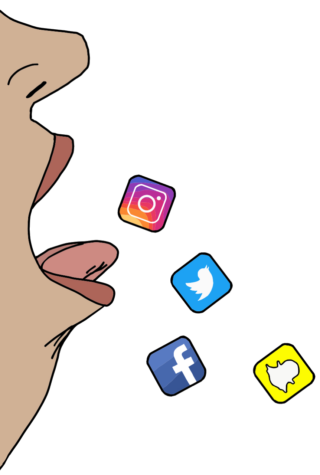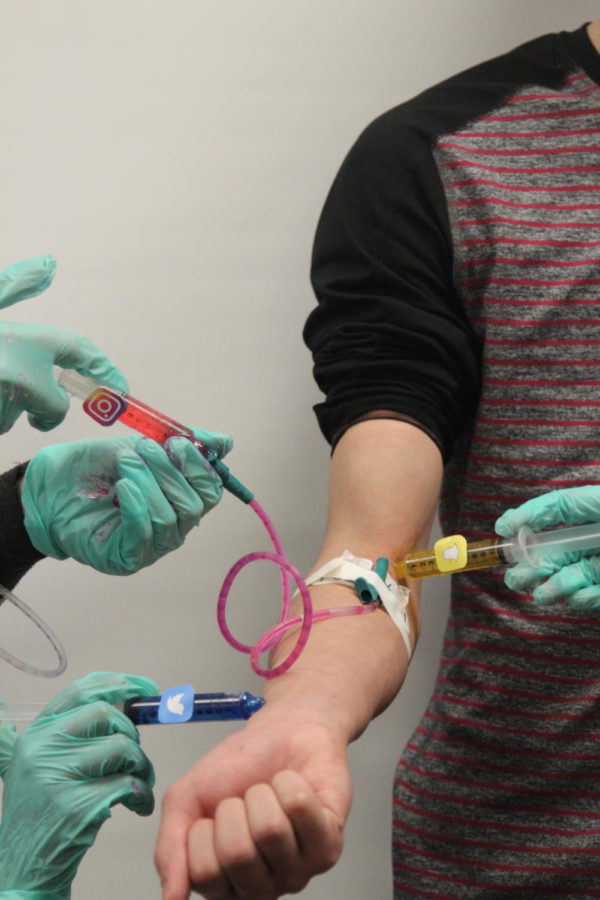How our addiction to social media is poisoning us
The toxicity of social media: How the pressure to post false content impacts our overall well being
You are sitting on your phone, your finger hovering over the pink and purple Instagram app. Just as you open it, a picture of your friend’s night out pops up. As you scroll down your feed, you see an “Instagram influencer” sitting by a pool: the lighting is just right, and the picture looks absolutely amazing. Then you notice all of the nice comments she is getting, and you think that her life must be like this all of the time. Suddenly you start to wish you were at a pool instead of sitting at home.
But is that really what her life is like?
“I think when people act fake they just try to be someone else and they are trying to show people what they want to see,” sophomore Precious Bautista Alexander said. Social media is causing people to change the way pictures – and people’s lives – are perceived on the internet. Instagram makes it easy to falsify our lives and make them appear better than they are.But how does that impact us? Here are the three biggest trends that cause people to feel bad about themselves on social media. One is body and face editing through popular apps like Facetune or Photoshop. Edited images can negatively manipulate the way people view themselves.
According to PRIME, the International Journal of Aesthetic and Anti-aging Medicine, 51% of teens says having acne makes having social media harder. 45% of kids that have acne says they are embarrassed to take pictures. Facetune makes it easy for people to edit out their acne, because all it takes is a swipe of a finger to erase their insecurities. Another way that people are pretending on social media is that they act like they have a better quality of life than they actually have. “Aesthetics” have become the new way to set up your account and have a theme that makes it seem more organized. The last factor is all of the friendship, relationship, and trip goals. When so many people post about their seemingly perfect relationships and vacations, it makes people question their own quality of life. “In today’s day and age, there’s a lot of pressure to post online and the sad thing is if that if you notice anybody that posts anything on Twitter, Instagram, or Snapchat, there is a pressure to display or show how good things are in your life,” Health Teacher Mark Goldsberry said . “No one posts any sad stories or bad stories to make everything look like they are fine.”
 When people want to be perceived a certain way it causes them to face pressures because they want to be seen in a positive light. Social media forces us to post the best version of ourselves because we want to experience positive feedback which helps boost our own self esteem. This psychological impact doesn’t just affect one gender more than another. Men and women face equal pressure to look a certain way. Men have to deal with the constant pressure to seem masculine and with women it is the exact opposite.
When people want to be perceived a certain way it causes them to face pressures because they want to be seen in a positive light. Social media forces us to post the best version of ourselves because we want to experience positive feedback which helps boost our own self esteem. This psychological impact doesn’t just affect one gender more than another. Men and women face equal pressure to look a certain way. Men have to deal with the constant pressure to seem masculine and with women it is the exact opposite.
Apps like facetune make is easy for people to change the way they look. This also forces them to look at their insecurities because they have to come to terms with what they don’t like about themselves
“I think that some people could think that everything is all about likes and comments, and it’s not,” sophomore Isabella Benson said.According to research in the Journal of Experimental Social Psychology from March of 2017, those who got more likes also had a higher sense of purpose. When we post more, we have a higher sense of life purpose because we are producing more content, and more people are encouraging us. This encouragement causes us to be online more and post more to stay “relevant.” When we see our posts not getting as many likes, it can make us seem not as relevant. To fix that problem, a lot of people delete their pictures when they don’t get enough likes.“You think you are going to get likes but then you just don’t,” Senior Ana Gomez said . “You don’t want a constant reminder of it.”
Aesthetic accounts are formed by people wanting it to seem like they have a perfect life. These accounts make everyone viewing them think the person that is running the account has a higher quality of life. This has a huge psychological impact on teens and young adults because there is a constant pressure and need to stay on top of their posts. This can cause a huge deal of anxiety and stress because it causes us to always feel the need to post. “I think it helps create a fake sense of positive self esteem for a lot of people,” Gomez said.
According to a 2016 BBC study of 1700 people, there is a threefold risk of depression and anxiety when people use social media. Goldsberry has been teaching a unit on social media in his health class for the past three years. Goldsberry wants students to understand how social media negatively impacts the brain. “We go over anxieties which are linked to depression caused by too much screen time, whether that be phone or computer,” Goldsberry said. Some people stage some pictures, and they try to make their Instagrams look pleasing. “I stage pictures a lot to try to make my instagram look better,” Benson said, “ and I feel like it does paint unrealistic view of how my life actually is.” When we post about our own lives it is easy to fake relationships and friendships with others because you can hide behind a screen.
The ability to manipulate a picture to make something look like reality is actually quite easy. “I think that sometimes they are unrealistic and they set an unrealistic expectation of how your relationship should be,” Benson said. Some experts recommend not engaging and taking breaks from social media from time to time. These two methods can work really well to stay off your phone and allow one to find time to do other things. By doing this you can reduce your chance of feeling pressured by friends to post or look or act a certain way online. It enables you to have a clear head because you aren’t attached to your phone and it also gives you a chance to be honest. “Honestly people should just be honest with themselves and with other people,” Sophomore Autumn Silva said. “You want people to see the real you.”
INSTAGRAM: REALITY:








